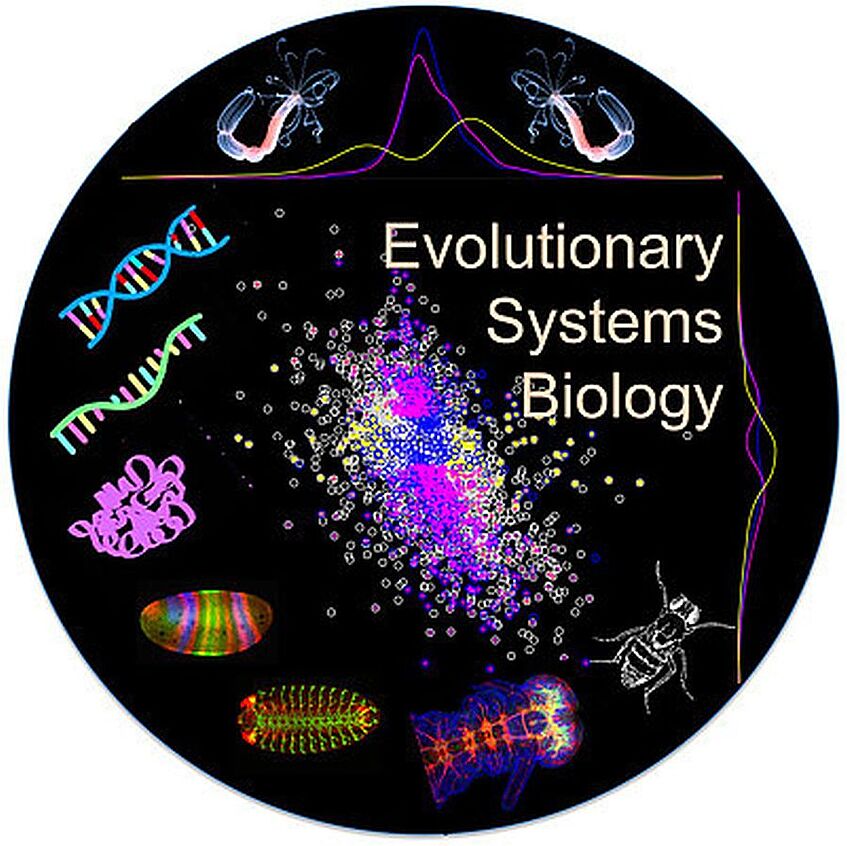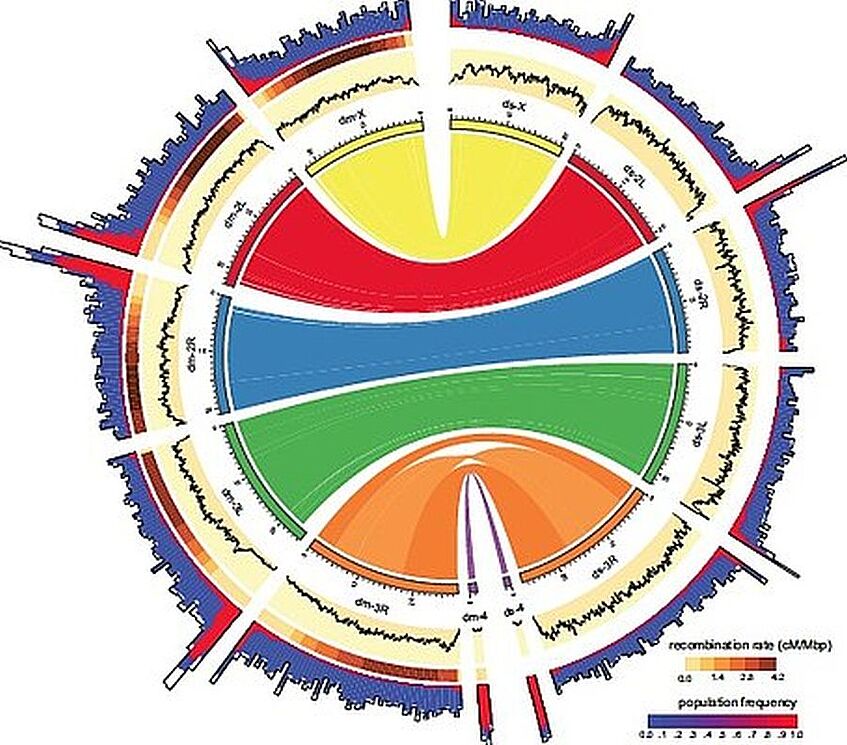Evolutionary Genomics and Systems Biology (Master)
The Programme in 90 Seconds
All over the world, research laboratories and biotech companies are looking for people who can tackle biological and medical issues with modern "omics" methods and are able to analyse the resulting complex datasets with bioinformatic and quantitative methods. To fulfil this demand, the new Evolutionary Genomics and Systems Biology (EGSB) master's programme provides the training necessary for this new type of scientist.
Specifically, EGSB master's students will:
- learn to transfer interesting biological questions into experimental designs;
- gain basic statistical and computational skills to analyse and model datasets;
- combine experimental "wet-lab" technologies with quantitative "dry-lab" methods;
- apply these skills to questions arising from evolutionary biology, development, comparative genomics, and systems biology.
Vienna offers a unique scientific environment for the EGSB master's programme, which will benefit from the expertise of research groups in population genetics, evo-devo, systems biology, and biomathematics at the University of Vienna and the Vetmeduni Vienna. Master's students will be able to draw upon the resources of two universities, and on established connections to world-class research institutes such as the Gregor Mendel Institute, IST Austria, the Vienna Graduate School of Population Genetics, and the evolVienna network.
Master of Science
Facts & Figures
- Students: n.a.
- Graduates in the last academic year: n.a.
- Number of semesters needed for graduation (median): n.a.
Data updated on: 03.12.2024
Admission Procedure
Information about the selection procedure
Information on Previous Studies:
In any case eligible degree programmes at the University of Vienna:
Getting started

Study Programme
During the first two semesters, the group of compulsory modules (Core Modules) imparts basic knowledge of research on evolutionary biology and systems biology and the methods commonly applied. This stage comprises the modules Population Genetics, EvoDevo and Molecular Evolution, and Quantitative Biology and Systems Biology. Additional compulsory modules and additional qualification modules (students’ choice) in the area of biology, mathematics and natural sciences complement the core modules and are a valuable addition to the master’s programme in Evolutionary Genomics and Systems Biology. To complete the master’s programme, students have to write a master’s thesis and pass a master’s examination.
Five Concepts
which you will deal with during your studies:
- Population genetics
- Systems biology
- Molecular evolution
- Applied data analysis
- Bioinformatics
... and many more.
Module description
-
MES1 (Population Genetics)
The module combines a lecture and a practical modelling/exercise course.
Objectives- Gain a fundamental understanding of the evolutionary processes within populations and species.
- Recognize selection, mutation, recombination, migration, and genetic drift as the forces to drive this process.
- Describe the evolutionary consequences of these forces in a quantitative model.
- Capture and interpret the genotypic and phenotypic patterns created by evolution on the population level.
-
MES2 (EvoDevo and Molecular Evolution)
The module combines a lecture and a seminar on current literature.
Objectives- Analyze, compare, and interpret evolutionary patterns on the molecular, developmental, and morphological level.
- Gain a solid overview of organismal diversity and phylogeny.
- Assess the evolution of key traits using molecular, genetic, genomic, and morphometric methods.
-
MES3 (Quantitative Biology and Systems Biology)
The module combines a lecture and a practical exercise course.
Objectives- Explain typical approaches in quantitative biology and systems biology and design experiments using these methods.
- Connect data from quantitative biology and systems biology with heterogeneous biological data sources.
- Understand basic methods for mathematical modelling, apply these to typical problems in evolutionary systems biology and interpret their results.
-
MES4 (Methodological basics)
The module contains courses on basic mathematical tools and a on statistics/bioinformatics.
Objectives- Gain a thorough knowledge and understand mathematical basics as well as quantitative and statistical methods to address questions of Evolutionary Systems Biology.
-
MES5 (Supplemental module)
Choice from a large selection of specialized courses.
Objectives- Acquire a deeper knowledge in special topics of Evolutionary Systems Biology and of relevant related disciplines.
- Interpret and discuss research projects and reports.
-
MES6 (Applied Data Analysis)
Major practical course on quantitative skills.
Objectives- Familiarity with principles and techniques of simple software tools to analyze biological data.
- Write programs in at least one common programming language.
- Gain practical experience with the implementation of data, text processing and parsing.
- Exchange information with external software tools and biological databases using a programming language.
- Plan and successfully complete computational projects.
-
MES7 & MES8 (Lab rotation I & II)
Small research projects in two groups and preparation for the Master thesis.
Objectives
- Familiarity with the general research concepts of Evolutionary Systems Biology.
- Acquire skills to conduct a research project in the frame of a Master thesis.
- Contribute to ongoing scientific research projects in the chosen research groups.
- Summarize research results in form of a scientific report and deliver an oral presentation in the chosen research group in the presence of the principle investigator.
-
MES9 (Proposal writing)
Training course for supplementary scientific skills.
Objectives
- Write a scientific proposal based on results obtained in MES7 or MES8.
- Present and defend proposal in an oral presentation.
Additional Information
-
Fakultäten
The teaching faculty members of the ESB Master's program are affiliated with the University of Vienna and the University of Veterinary Medicine Vienna.
- Institut für Populationsgenetik, Vetmeduni
- MABS, Faculty of Mathematics, University of Vienna
- Dept. of Neurosciences and Developmental Biology, University of Vienna
- Dept. for Evolutionary Biology, University of Vienna
- Cube, Division of Computational Systems Biology, University of Vienna
- Dept. for Functional and Evolutionary Ecology, University of Vienna
- Dept. of Botany and Biodiversity, University of Vienna
-
Contact
University of Vienna
- Univ.-Prof. Dr. Ulrich Technau - ulrich.technai@univie.ac.at
- Univ.-Prof. Dr. Joachim Hermisson - joachim.hermisson@univie.ac.at
University of Veterinary Medicine Vienna
- Univ.-Prof. Dr. Christian Schlötterer - christian.schloetterer@vetmeduni.ac.at
Student's Opinion ...

"The EGSB program has helped me acquire a basic skill set for handling big data from various sources while also allowing me to pursue my scientific interest in evolution in a very broad sense. I am glad to have chosen this program as I feel it provides a solid foundation as well as opportunities to explore a range of fields, with the flexibility to choose what area you want to focus on."
Julia H.

"The EGSB program offers a myriad of topics that are at the forefront of biological research, while allowing students an element of flexibility to chart their own course. The carefully structured modules are supported by great faculty, ensuring that student training and guidance is ample! All in all, a must do program for those who want to enter the world of big data in biology."
Sanjay N.

"The EGSB Master's provides an ideal hotbed for modern computational biology. With its unique combination of bioinformatics, its modern take on evolutionary biology and enough leeway to develop my own interests, it was a door opener to many exciting opportunities."
Lukas W.
Overview of the programme structure & topics
Here you find the current offer of courses for this programme to gain better insight into the topics and structure. For more information please click on the respective level.
Teachers' Opinion

Teachers' Opinion
"The EGSB master’s programme is embedded in a top-notch research environment. A special feature is the offered training in quantitative skills by focusing on topics centred around evolutionary biology. The programme covers the entire spectrum from the analysis of populations to between species differences. For me, it is a pleasure to train the next generation of biologists. They will be familiar with quantitative data analysis and gain a thorough education in a high-profile biological sub-discipline.
My research focus is on adaptation of evolving populations to a novel environment and functional innovations. Both topics are central to the training provided in the master’s programme and students will be given the opportunity to participate in cutting edge studies on these research topics."
Prof. Dr. Christian Schlötterer
"I am working on construction and analysis of quantitative models to understand key phenomena in evolution, such as conditions for adaptation and speciation. Modelling is a central topic of the EGSB master’s programme right from the start. In lecture courses, students will learn about the key models of population genetics and systems biology. In practical courses, they will learn how to play with these models and analyse them using analytical and computational tools."
Prof. Dr. Joachim Hermisson
"Due to the development of second generation sequencing technologies, EvoDevo has converged with Comparative Genomics and Molecular Evolution. We follow this integrative approach, which promises deep insights into the evolution of animal body plans and cellular differentiation. New technologies allow to tackle the evolution of genomic features, including chromatin marks, DNA methylation, cis-regulatory elements, regulatory non-coding RNA, alternative splicing, transposable elements and gene duplications in non-model organisms. This new EGSB master will fill a gap and train a new generation of scientists who know to ask the relevant biological questions but also know how to analyse big data from the genomic and systems biological approaches. Researchers with this profile and expertise are highly searched for in many related modern fields of biology."
Prof. Dr. Ulrich Technau
After Graduation
An EGSB master's degree provides graduates with an excellent foundation which enables them to pursue a doctorate, such as a PhD in quantitative biological research and opens up a wide variety of career opportunities in research-oriented biomedical/biotechnological companies.
Graduates can pursue a career in the following areas:
- research at universities and in the non-university sector
- basic and applied research (e.g. in medicine, biotechnology, pharmaceutical research, agricultural sciences and environmental sciences)
- research communication
- planning and implementation of research projects
- research administration and research management
- subject-related teaching activities at post-secondary educational institutions
- computer-based analysis of big data sets
Graduates' Opinion ...

"The Evolutionary Genomics and Systems Biology Masters Programme helped me gain the skills, experience, and confidence I needed to build a career in evolutionary biology. When I entered the program, my main goal was to build skills in computational biology. The program’s coursework helped me develop the foundations to perform cutting-edge research in this field. The hands-on mentorship and training have had a pivotal impact on my career trajectory. I received several offers for entering the PhD program in several american top Universities and today I am a fully-funded PhD student in Ecology and Evolutionary Biology at Yale University, applying skills I learned at the University of Vienna to new projects and questions."
Dalila D.
Graduates' Perspective on the Degree Programme
Graduates ...
- say that this degree programme receives the grade: 2.6 (satisfactory)
- rate the level of difficulty as: 3.4 (appropriate)
→ These results are based on feedback from 5 graduates.
*You can find further assessments of the degree programme from its graduates’ perspective in the graduate survey of the master's programme in Evolutionary Systems Biology (in German).
Graduates ...
- find employment within 3 months after graduation on average.
- earn an average of € 2,951 (women) and € 3,262 (men) gross per month within three years after graduation.
- work full time at a percentage of 69% (women) and 60% (men) within three years after graduation.
*You can find further information on career entry and career paths in the tracking of graduates "MA Biology".
